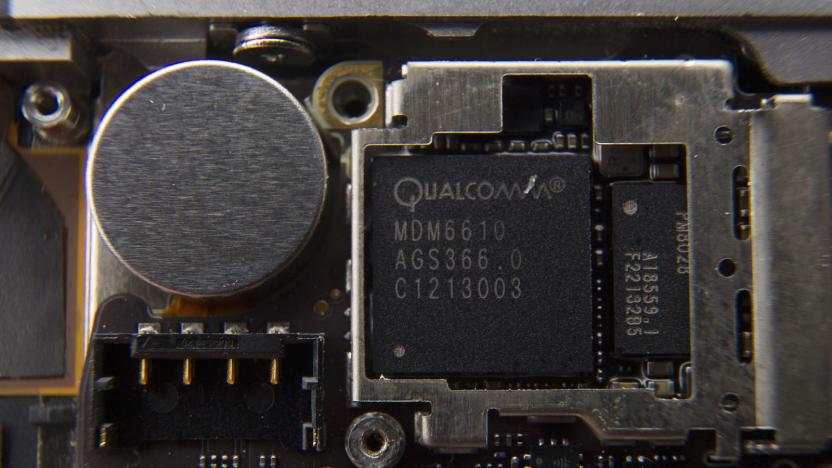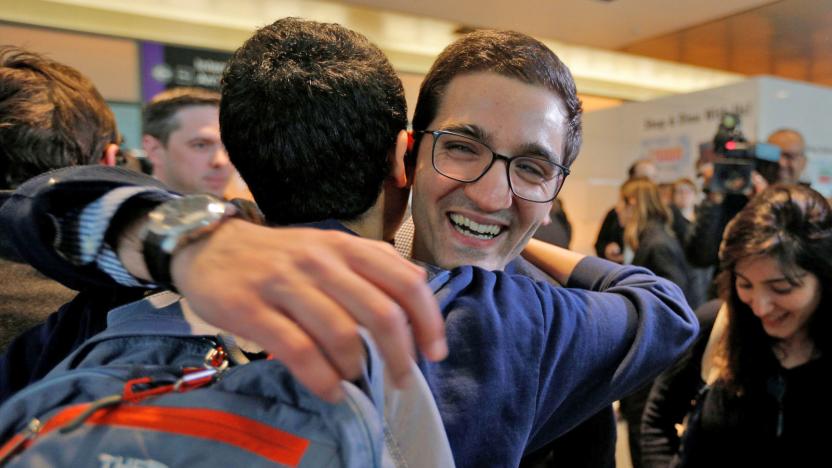amicusbrief
Latest

Intel and Samsung back FTC lawsuit against Qualcomm
The Federal Trade Commission kicked off 2017 by targeting Qualcomm over allegedly anti-competitive behavior, and unsurprisingly, companies the chipmaker competes with agree. Intel and Samsung filed briefs supporting the FTC lawsuit, claiming that Qualcomm uses its dominant position in the mobile processor industry to squeeze others out.

Apple, other tech giants will support transgender student's case
Several tech titans plan to sign an amicus (friend of the court) brief in support of a 17-year-old transgender student's fight in court, according to Axios. Apple, Microsoft, IBM, PayPal, eBay, Airbnb, Box, Yelp, GitHub, Salesforce, Slack and Tumblr are expected to back Gavin Grimm's legal battle against his school board for the right to use the bathroom that matches his gender identity. The amicus brief, created by LGBT organization Human Rights Campaign, will be filed in favor of Grimm for the Supreme Court hearing scheduled to take place on March 28th.

127 tech firms team up against Trump's immigration ban (updated)
As expected, Intel, Google, Microsoft, Apple and 93 other tech firms have filed an amicus brief in support of lawsuits against President Donald Trump's executive order barring immigrants from seven countries. "The Executive Order abandons these principals [of tolerance, equality and openness]," the brief, spotted by Ars Technica, states. "[It] inflicts significant harm on American business, innovation and growth as a result."

Calvin Klein thinks Apple was paid fairly in Samsung patent case
The exhausting brawl between Apple and Samsung over patents simply refuses to die the horrible, gruesome death it deserves. Samsung is the more bloodied, you may recall, having paid Apple a $548 million settlement for violating a bunch of patents (not that Cupertino is done squeezing money from the Korean company). That big payout is due to be reviewed and potentially reduced by the US Supreme Court, however, with Samsung arguing it shouldn't have had to hand over every cent of profit it made on devices that were found to specifically infringe Apple design patents. Naturally, Apple disagrees, and now it's got none other than Calvin Klein fighting in its corner.

Government using sci-fi, fantasy to justify iPhone unlocking
San Bernardino County's district attorney has made its argument as to why Apple should unlock Syed Farook's iPhone and it's, it's something. Ars Technica dug out the court filings in which officials claim that the device could have been used to introduce a "dormant cyber pathogen" onto government networks. Of course, there's no official definition of what that means, unless it's a fantastical euphemism for virus. The documents are so weirdly alarmist (and, you know, wrong) that San Bernardino itself has distanced itself from the filing.

Department of Justice comes out against Aereo's TV streaming in Supreme Court case
It's never a good idea to make an enemy of the federal government, and it appears that Aereo now finds itself in just that predicament. On Monday, the US Department of Justice came out in favor of the broadcasters that oppose Aereo in a case currently before the US Supreme Court. The feds filed an amicus brief -- a legal memo aimed at educating swaying the justices to a certain point of view written by someone not a party in a lawsuit -- that refutes Aereo's position that it doesn't need to license the content viewed by its users. The case is, of course, all about copyright law, and specifically, it raises the question whether or not Aereo's technology enables public or private performances of the video being watched (public performances constitute infringement, private ones do not).

Dropbox backs petitions to disclose exact national security request numbers
The call for greater US government transparency just got louder: Dropbox has filed a Foreign Intelligence Surveillance Court brief that endorses petitions to disclose exact national security request numbers. Much like LinkedIn, Dropbox believes that limiting disclosures to broad ranges hurts transparency by implying that smaller firms get as many requests as larger rivals. The ban on exact figures also violates a First Amendment right to publish specific information, according to the cloud storage provider. We likely won't know the effectiveness of the brief for some time -- or ever, if the court proceedings remain a secret -- but Dropbox can at least say that it made its case.

Blizzard responds to Public Knowledge about WoW Glider
As we've been posting on WoW Insider, Blizzard is entangled in a lawsuit with the makers of WoW Glider, a bot program that is against WoW's terms of service. And there's been a wrinkle in the case -- an advocacy group called Public Knowledge has filed an amicus brief in the lawsuit arguing for Glider, and saying that if Blizzard wins this case, it could set a precedent for copyright law that would make any copying of a computer program (including the simple act of copying it for an install to the hard drive) be illegal at the IP owner's will. That's unacceptable, says Public Knowledge, so even though they agree that Glider may be against the ToS, they don't think Blizzard should win the case.And now Blizzard has responded to Public Knowledge, and their argument isn't all that new. They claim that when you "buy" your WoW software, you don't actually own it -- you're just "licensing" it to use it on your computer. This is an argument that's long been used by copyright owners to claim that end users don't have the right to hack or otherwise modify their software, and it opens up a whole other can of worms, not least of which is that Blizzard is claiming if Glider wins this case, then all software "sales" ever really will give end users the ability to hack or modify it at will (something that a company like Microsoft, with their Windows OS, wouldn't want to happen).As we've said before, there are a few ways this case could pan out, and it's likely that it won't end with either of the doomsday scenarios that Blizzard and Public Knowledge are describing -- the court could still rule narrowly in favor of Blizzard, stopping Glider but staying away from the other messes brought up here. Oral arguments in the case started this week -- we'll keep an eye on what happens next.[via Massively]






